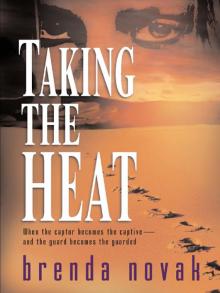- Home
- Brenda Novak
Right Where We Belong Page 2
Right Where We Belong Read online
Page 2
“I felt that way at the time, but I’ve changed my mind. I don’t think it’s good for them to stay here, to try to bear up beneath all the negative energy. And I know it’s not good for me. We need a fresh start.”
There was a slight pause. Then he said, “Why the sudden change of heart?”
“I told you. I can’t handle the anger and the blame. It feels as if almost every person I meet hates me. And I doubt that’ll go away anytime soon.”
“What do you mean? Why would they hate you? You’re not the one who raped those women. They don’t think you helped Gordon in any way...”
“No one has launched that accusation, thank God. Right now, they’re only blaming me for missing whatever signs I should’ve seen.” She stared glumly into her glass. “And maybe they have the right. I can’t say anymore what I should or shouldn’t have done. Would some other woman have noticed that he was too secretive? Would she have called his work to verify his hours and location? Would she have searched his stuff and found that ‘rape kit’ hidden in the shed out back?”
“We’ve been through this. There was nothing to make you doubt him. You even had a regular sex life—or that was what you told me.”
“We did, for the most part. But how would I know? I was twenty when I married him, and he’s the only man I’ve ever been with. Who am I to say what’s normal between two people? I can only judge from my own experience. Maybe you should tell me.”
“I’ve never been married. So far, my longest relationship has lasted two months.”
Still, he had more sexual experience than she did, but when he chuckled about that, she wondered, as she often did, why he hadn’t ever made a commitment to anyone.
She figured he would eventually—he was only twenty-four. Regardless, that was a question best left for another time. Tonight, she was too bogged down by thoughts of Gordon and what he’d done. “They found blood from one of the women in our van. Did I tell you that? He had his family riding around in a vehicle that still had the blood of a woman he’d attacked.”
“You told me. That was when we both decided we could no longer maintain our faith in him, remember?”
She raked her fingers through her hair as she studied herself in the mirror above the dresser. She no longer even looked like the woman she used to be. She hadn’t taken the time to get her hair trimmed—hadn’t wanted to visit the salon she normally frequented while everyone there was whispering about her—so it had grown out of the bob she’d been wearing before her world collapsed. All she could do was pull the thick, auburn mass into a ponytail or let it go wild and curly. She’d always liked the gray blue of her eyes, but they looked empty now—hollow, shell-shocked. Who was this person staring back at her with a face so pale she could almost trace the blue veins underneath? “Maybe I should’ve noticed the blood.”
“You have children. They scrape their knees and elbows now and then, don’t they? And Gordon fixed mining equipment, which meant he had to have injured himself occasionally. Why would you assume—from a few drops of blood—that he was out harming women?”
She turned away from the mirror, couldn’t bear to look at herself any longer. “I don’t know. It’s just that so many people think I should’ve spotted something. I’m beginning to doubt myself. The morning after he raped Meredith, he had scratches on his arm. I asked how he got hurt. He said he backed into a ditch he didn’t see at a mine site and got scraped up by blackberry bushes while trying to get a two-by-four under his rear tire. Maybe that seems like a lame excuse now that the police have pointed out the pattern of those scratches. It did look like four fingernails had gouged his arm, but...I honestly thought nothing of it at the time.”
“It’s only been a month since they locked Gordon up, Savanna. Surely things will get easier.”
She detected a hint of impatience. He’d heard so much about her problems of late. As sympathetic and supportive as he’d tried to be, she’d been falling apart for too long, ever since she’d learned that her husband was the primary suspect in the string of violent sexual assaults that’d sent the good people of Nephi into a panic. Understandably, Reese was eager to get back to his regular life. He was her younger brother, after all, wasn’t used to having to support her so much. She’d been the one to carry them both through the loss of their elder brother and both parents a little over a year ago.
He’d had enough sorrow for one fourteen-month period. She felt like an idiot for not realizing before now that she’d exhausted his reserve of compassion, that this was the point where she’d need to soldier on alone.
“I’ll let you go,” she said abruptly.
After a brief silence, he said, “I’ll call you later, okay?”
He probably felt guilty for revealing that hint of impatience. But he was with someone. He’d said that. Anyway, if he was capable of moving on after losing, all at once, three members of their immediate family and was beginning to feel good again, she wouldn’t continue to drag him down. “There’s no need,” she said. “I’m fine. I just wanted to let you know that I’ll be moving as soon as I can arrange it.”
“That takes time. You’ve got to sell the house, don’t you?”
“No.”
“You’re going to walk away from it?”
“Why not? There’s no equity. Gordon took out a second mortgage almost as soon as he inherited it from his grandmother. With the market the way it is...we’ve been upside down on this place for two years or more.”
“What about your credit?”
“The house is in his name. He never put me on the loan or the title. If his mother wants to save this place, she can move in and make the payments. I’ll leave all of his stuff behind—” she’d already boxed them up and stacked them in the garage, anyway “—and put the keys under the mat.”
“But where will you go? Back to Long Beach?”
“No.” They’d sold the beautiful five-bedroom, four-bath home their parents had owned in Los Angeles, where they’d been raised, and split the proceeds. Reese had paid off his student loans and was using what he had left for graduate school. He was planning to be a doctor. She’d spent a portion of her inheritance on Gordon’s defense—which she now considered to be a waste of money.
“Then where?” he asked.
The only place she could go. “The farmhouse in Silver Springs.” It was all she had left.
“Savanna, no. That place needs too much work. Dad was barely getting started with it when he...when they had the boating accident. How will you live there?”
“I’ll renovate it myself.” And why not? They had to do something with it. And neither one of them had wanted to put it up for sale. That home hadn’t been just another real estate purchase to their father, although he’d done a lot with real estate over the course of his life. This was the ranch his grandparents had once owned. He’d had fond memories of the place, was so excited to be able to bring it back into the family where he’d said it belonged.
“With what money?” Reese asked.
“The money I have left from the LA house.”
“That won’t carry you very far, not when you’ll be using it for the repairs as well as your monthly overhead.”
“Without a mortgage or rent, I should be able to manage a basic renovation and survive for a year, if I’m careful.”
“And what will you do once the renovation is complete?”
“I don’t know, Reese. Worst case, I’ll have to sell and move on, figure out what comes next for me. Best case, I’ll be able to get a loan against the property, give you your share and rebuild my life in Silver Springs.”
He cursed.
“What? You don’t like the idea?”
“I don’t like what you’re having to deal with. It’s not fair. First, we lose Mom, Dad and Rand—and then, as if that wasn’t tragic enough, Gordon starts ra
ping women? How does all of that even happen to one person?”
She didn’t answer his question. Her mind had shot off on a tangent. “Maybe that was why I missed it.”
“Missed what?” he said, sounding confused.
“What Gordon was doing. I was so torn up I wasn’t paying as much attention to him as I should have been. I was barely holding myself together, trying to get through it.”
“But he only raped one woman last summer. The other two he attacked six months ago—almost back-to-back. Why the big gap if it was your bereavement over Mom, Dad and Rand that set him off?”
“There might not be a gap. The police believe he victimized other women. They’re looking at unsolved cases that might be similar in the cities and towns near the mines where he worked.”
“Shit...”
“You’re missing the point. I’m saying my grief—the fact that I was wrapped up in my own problems—is what might’ve started him down that road.”
“I understand, but that’s hardly an excuse. My God, you were mourning the loss of more than half your family. He should’ve been trying to support you for a change.”
She took a sip of wine. Gordon had never been particularly supportive, not in an emotional sense. He’d worked and contributed his paycheck to the upkeep of the family, same as she did, but he wasn’t all that engaged. He’d been gone too much and tired and remote when he was home.
Still, she’d thought they had a decent marriage, one that she could make work. Her parents had been together for thirty-two years when they were killed. She’d wanted that kind of life—one devoted to her family—and had been determined to stick it out for the long haul, even if Gordon wasn’t perfect. “You’re right. I don’t know what started it. I just keep guessing.”
“There’s something wrong with him. That’s what started it.”
She leaned against the headboard and covered her feet with a blanket. “I wish I could go back to using Dad’s last name.”
“Why can’t you?”
“Because then I’ll be a Pearce and my kids will be Grays.”
“So change theirs, too.”
“I will eventually. But not now. I can’t deal with that on top of everything else.”
“No one in California will tie you to the rapist in Nephi, Utah, anyway.”
“Thank God I won’t have everyone staring at me when I go to a gas station or a store.” She heard a woman talking to him in the background. “I’ll let you go. Have a nice night.”
“Savanna?”
She pulled the phone back to her ear. “Yeah?”
“Call me when you’re ready to move. I’ll come help you pack and drive the van.”
He was in graduate school at the University of Oregon in Eugene, which wasn’t close. And it was the third week in April, so he had finals coming up. She didn’t plan to wait until he could help. “There’s no need, little brother. I got it.”
Taking a deep breath, she hung up, finished her wine and somehow resisted the urge to pour another glass. She had to be careful, couldn’t allow herself to fall into a bottle. Gordon’s mother had been an abusive alcoholic—it was why his father had left them so long ago. Savanna would never forget some of the upsetting stories he’d told her—of coming home to find his mother passed out on the couch, soaked in her own urine; of his mother nearly dying of smoke inhalation after falling asleep with a lit cigarette; of his mother screaming and cursing and throwing objects at him when he was a small boy. Maybe Dorothy was the reason he’d turned out so bad. The detective investigating his case had said that rape was more about power and control—and venting anger—than sexual gratification. But it wasn’t as if Gordon’s victims had resembled his mother in any way. And he’d grown close to Dorothy in recent years. They seemed to adore each other...
There were no easy answers, she decided, and got up to start packing. Part of her felt she should stay until the end of the school year. Although it went longer than Reese’s semester in college, it was still only six weeks away. But now that she’d made the decision to move, she couldn’t wait even that long.
2
Two months ago, Gavin Turner had given up his studio apartment over the thrift store in Silver Springs, California, an artsy town of five thousand not far from Santa Barbara, and purchased a home—a converted bunkhouse from the 1920s that sat on a whole acre about ten minutes outside of town. After living in such a small space, surrounded by buildings, he almost didn’t know what to do with all the extra room. His friends jokingly referred to his remote location as the “boondocks,” but he enjoyed being out in the open and even closer to the Topatopa Mountains, where he often went hiking or mountain biking. He’d always been drawn to the outdoors. The beauty and solitude brought him peace. He was pretty sure he wouldn’t have been able to navigate his unusual and difficult childhood if not for his love of nature. And music, of course. He strummed on his guitar almost every night, had started singing at various bars in the area and along Highway 101, which ran along California’s coast. He hadn’t landed any notable gigs yet, just performed in various coastal or farming communities, mostly up north. He wanted to break into the music scene, but the competition was so fierce he felt he’d have to move to Nashville, where there was so much happening in the music industry these days, to get where he was hoping to go, and he couldn’t commit to that quite yet. Not while his mother—or, rather, the woman he called his mother—needed him. For now, he enjoyed singing at a different hole-in-the-wall each week. The money he earned augmented what he made working at New Horizons Boys Ranch, the boarding school for troubled boys his adoptive mother had started over twenty years ago and where he’d gone to high school himself.
Tonight the weather was warm and the cicadas were loud as he sat out on the porch in a simple T-shirt and worn jeans, writing a new song. He’d just sat back to take a break and was wondering whether he should get a puppy—he was leaning toward yes, since he hadn’t been able to have a pet in town—when a large moving van came rumbling down his road.
He rarely had visitors, but no one else lived on this road, so he set his guitar to the side and stood.
The truck didn’t stop, however. The woman driving—he was fairly certain it was a woman, but he was judging on size alone, since it was difficult to see in the dark—barely glanced his way. Focused on what was right in front of her, she barreled forward as if she’d had a hard journey and would finish it, this uneven surface be damned.
Who was that? And where was she going? The only other house nearby was the ranch house to which his own converted bunkhouse had once belonged. And it had sat empty for the past three years or longer. According to what Gavin had been told, it wasn’t even for sale—not that he could’ve afforded the bigger property, anyway.
He shoved his hands in his pockets as he watched the truck bounce and sway past him. Although the road was supposed to be privately maintained, it hadn’t been maintained at all, not in a number of years, which made the potholes deep and difficult to miss—and she seemed to be hitting most of them.
Did this mean he had a new neighbor? If so, how would she get through to her house? The bridge over the creek that ran between the two properties had washed out in the last heavy rain.
She didn’t seem to be aware of that, though. At least, she wasn’t slowing down...
He took off running to warn her before she could wind up in the water. Banging on the truck as he came alongside, he attempted to get her attention before she could crush him against one of the trees that gave him so little room as it was. “Whoa! Hey! Stop!”
She seemed reluctant to let him waylay her. Either that, or she was afraid of what encountering a strange man out here in the middle of nowhere could mean. Because even after she hit the brakes, she barely cracked the window so that they could hear each other speak. “Something wrong?”
He edged around a thorny bush in order to get close enough to see her. About his age, with a riot of thick, copper-colored hair and light-colored eyes, she studied him with more caution than he’d ever seen before. Two children—a boy and a younger girl—leaned forward to peer around what he could only assume was their mother.
“You can’t go down that way,” he explained, gesturing at the road ahead. “The bridge is washed out.”
“What bridge?” she asked.
He blinked in surprise. “The bridge that goes over the creek.”
She scowled. “You mean before you reach the house?”
He swatted a mosquito. It’d been a wet year, and now that spring had arrived, the vicious little monsters were coming out in force. That was the one downside to living in the country. “Haven’t you ever been here before?”
“No.”
He wiped some blood from a scratch on his forearm. That darn bush had gouged him before he could avoid it. “You’ve got all your belongings with you, right? You are moving in.”
She finished rolling down the window. “Yes, but I’ve only ever seen the pictures my father sent.”
“So he’s the one who owns the house.”
“Not anymore. He passed away in a boating accident a little over a year ago. The property belongs to me and my younger brother now.”
“I see. I’m sorry for your loss.”
She frowned. “Not as sorry as I am.”
Gavin’s gaze shifted to the children. “Where you all from?”
“I was born and raised in LA—Long Beach. But I’ve been living in Utah since I left for college. That’s where both my children were born.”
“In Nephi,” the boy piped up, seemingly proud that he could add this bit of information.
“Nephi, huh?” Gavin said. “Never heard of it.”
“It’s small but not too far from the Salt Lake Valley, if you’re familiar with that,” the woman said. “About two hours south.”
Gavin whistled. “Sounds like a long drive from there to here, especially in a moving van.”

 Falling For You
Falling For You A California Christmas
A California Christmas When I Found You
When I Found You Sanctuary
Sanctuary Home for the Holidays (Silver Springs)
Home for the Holidays (Silver Springs) One Perfect Summer
One Perfect Summer Christmas in Silver Springs
Christmas in Silver Springs Before We Were Strangers
Before We Were Strangers Coulda Been a Cowboy
Coulda Been a Cowboy Blind Spot
Blind Spot That One Night
That One Night The Perfect Murder
The Perfect Murder Falling For You (Dundee Idaho)
Falling For You (Dundee Idaho) In Close
In Close Home for the Holidays
Home for the Holidays A Dundee Christmas
A Dundee Christmas The Perfect Couple
The Perfect Couple On a Snowy Christmas
On a Snowy Christmas Her Darkest Nightmare
Her Darkest Nightmare When We Touch
When We Touch A Winter Wedding (Whiskey Creek)
A Winter Wedding (Whiskey Creek) The Perfect Liar
The Perfect Liar Dead Silence
Dead Silence Baby Business
Baby Business Shooting the Moon
Shooting the Moon A Home of Her Own
A Home of Her Own Taking the Heat
Taking the Heat Of Noble Birth
Of Noble Birth Every Waking Moment
Every Waking Moment Face Off
Face Off Expectations
Expectations Hello Again
Hello Again When Snow Falls
When Snow Falls Come Home to Me
Come Home to Me Be Mine at Christmas
Be Mine at Christmas The Secrets She Kept
The Secrets She Kept In Seconds
In Seconds No One but You--A Novel
No One but You--A Novel Dear Maggie
Dear Maggie Hanover House: Kickoff to the Hanover House Chronicles
Hanover House: Kickoff to the Hanover House Chronicles When Summer Comes
When Summer Comes Discovering You
Discovering You Inside b-1
Inside b-1 Body Heat
Body Heat Sweet Dreams Boxed Set
Sweet Dreams Boxed Set A Family of Her Own
A Family of Her Own Stop Me
Stop Me Inside
Inside The Heart of Christmas
The Heart of Christmas In Seconds b-2
In Seconds b-2 Through the Smoke
Through the Smoke The Other Woman
The Other Woman We Saw Mommy Kissing Santa Claus
We Saw Mommy Kissing Santa Claus 05 Take Me Home for Christmas
05 Take Me Home for Christmas Killer Heat
Killer Heat This Heart of Mine
This Heart of Mine Until You Loved Me--A Novel
Until You Loved Me--A Novel Cold Feet
Cold Feet Snow Baby
Snow Baby Dead Giveaway
Dead Giveaway Face Off (Dr. Evelyn Talbot Novels)
Face Off (Dr. Evelyn Talbot Novels) Just Like the Ones We Used to Know
Just Like the Ones We Used to Know A Baby of Her Own
A Baby of Her Own Take Me Home for Christmas wc-5
Take Me Home for Christmas wc-5 Finding Our Forever
Finding Our Forever Historical Romance Boxed Set
Historical Romance Boxed Set Right Where We Belong
Right Where We Belong Big Girls Don't Cry
Big Girls Don't Cry